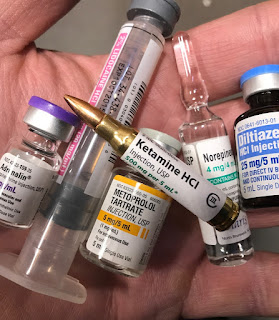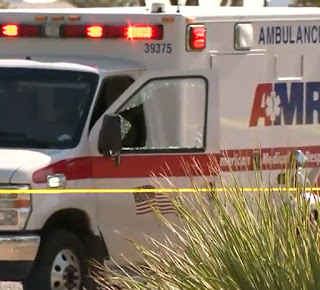Missing the Point
At some point early in my career I identified a deep internal conflict. I discovered that to realize the full potential of my skills
both as a firefighter and as a paramedic, someone else in the world had to have
a really bad day. This troubled me immensely. It troubled me because I was
surrounded by colleagues who would quite openly say things like "I'm
bored... someone needs to die," or "Man, this would be the perfect
night for a structure fire." It troubled me because I said and thought
those things, too.
We can't all be faulted. We don't know any better. We learn in class and on the streets that the only thing that matters is the technical. Ventilate. Intubate. Stop the bleeding. Fix the heart rate. Open the airway. Yet, since few of our patients require immediate performance of these critical skills, we start to question our importance. We wonder how we're making a difference. We worry that our skills are perishing. In simpler terms: we get bored. And then we wish for critical calls wherein we can make a difference, because that is what we and everyone around us identifies as important. We're like an astronomer who spends his time looking for the extremely brief and rare supernovae. He casts aside the every-day sunset, the phases of the Moon, and the rotation of stars around Polaris because they are commonplace. They're mundane in comparison. The astronomer wishes for the supernova. Firefighters wish for working fires. EMS personnel - we wish for critical patients.
Intentions, I believe, have
real-life consequences. There are not-so-fringe scientists who are starting to
study and openly write about the connection between our consciousness, our
intentions, and what manifests in reality. We set forth intentions all of the time. Often we don't even realize we're doing it. Prayer, for example, is merely ritualized
intention identification. When we say "God, please give me strength,"
we are focusing on our intentions and desires; we are seeking to make them
reality. We're looking for help from the Creator- or at least from the
Universe. Sometimes it's not prayer, but simple hope: "I hope Tom Brady throws six interceptions in the Superbowl." Sure, it's less rigid than prayer, but it's an intention nonetheless.
We do this rather frequently - hope or pray for things. It is therefore logical to assume that we must believe our intentions have power. But if we believe our intentions can, in fact, produce tangible results, it
seems that prudence would prescribe some thoughtfulness on our part before
we ask for things. "Be careful what you wish for..." is sage advice.
Wicca, for all its neopaganism and
new-age fluff, adheres to one of the most beautiful, if not simply practical
versions of the golden rule. The Wiccan "Threefold Law" or "Law
of Return" states that whatever energy a person puts into the world,
whether positive or negative, will eventually return to the sender three times
over. Again, an emphasis on being cognizant of what will happen if we actually
get the things we desire.
In EMS we worship the critical call. In the fire service we appeal for the structure fire. But when I arrived to find the teenager in traumatic
cardiac arrest, or stood by while a family desperately searched the charred
remains of their home to find the box that contained a lock of hair from the
child they lost twelve years earlier, how could I reconcile my reckless
intentions?
We'd been called with another ALS agency for an 80 year old male who was unresponsive. There was a torrential downpour happening on that summer afternoon, and my partner and I were soaked just walking from the rig to the front door. When we got inside we saw a fairly routine scene. Two police officers were performing CPR on an elderly man on the living room floor. From the doorway the man's wife quietly, almost stoically, looked on. We got a quick report from the police - the man was complaining of feeling ill and then his wife witnessed him collapse. She called 911 and when the patrolmen arrived on scene they encountered a dead guy. CPR was started, AED applied, and then we walked in. It was all pretty standard.
I started an IV, my partner put the patient on the cardiac monitor, and I moved to the head to attempt an advanced airway. Thunder shook the house as I opened my laryngoscope. I peered in, looked for a bit, but could not visualize vocal cords so I backed out. The second ALS agency arrived and I asked the medic to take a look. He positioned himself, and as he started the laryngoscopy, a second, louder clap of thunder rattled the house and the power went out.
We worked this man for about twenty-five minutes and got no response. After consulting the ER physician and speaking to the man's wife, we decided to terminate efforts.
I took the wife aside and explained that her husband had died. She cried, but nodded knowingly. I suppose you start to expect this as you reach your last years. I thought thus would be like most of the other notifications I'd done over the previous ten years, but for some reason this was different. I got a glass of water for this woman and sat with her in the kitchen. I asked how long they'd been married (45 years). I walked her through everything. I told her it was okay to go talk to her husband - to touch him and say goodbye. We gave her some privacy. When she was done, I looked up the number for her church and arranged for their priest to come and administer last rites. I helped her find the information for the funeral home they'd planned on using. When it was time to go, I hugged her and told her I was sorry for her loss.
Two weeks later, our unit received a card and a $100 donation. It was from the wife of that man we couldn't save. She was touched by the way we cared for her. Epiphany.
For all these years I'd been missing the point. It wasn't just my skills on critical calls that defined me as a good paramedic. It was my service. The honor lies not in the intubation, the chest decompression, or the recognition of a STEMI with non-traditional presentation. The honor is in the compassion. The kindness. The thoughtfulness. It's being there when people need help - because that's what we do.
If you find your worth in EMS solely from the critical skills- if you can't leave a shift feeling good when you don't take a code or a septic shock or a massive STEMI, you're doing it wrong. The reward is in the service.
We are called to hundreds of scenes in our careers. How sad would it be to classify 85% of them as failures? Wastes of our time? If you gauge your prowess as an EMS provider by the number of advanced skills you perform, you're destined for despair; and you're missing the point.


yep.
ReplyDelete"People will forget what you said. People will forget what you did. But people will never forget how you made them feel."
ReplyDeleteThank you for writing this. It's a critically important lesson, especially for new practitioners. And you've done a nice job with the writing itself.
ReplyDelete-Marc in Alberta
Thank you! I like to indoctrinate new providers that I teach about this perspective on EMS. Your comments are appreciated, Marc. Stay safe up there in Alberta!
ReplyDelete